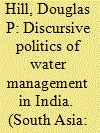| Srl | Item |
| 1 |
ID:
157093


|
|
|
|
|
| Summary/Abstract |
Orthodox approaches to managing Himalayan rivers endorse a singular focus on water as a resource to be harnessed for national security and economic progress, as epitomised by the proposed acceleration of large-scale hydropower construction in the Brahmaputra basin. In reality, existing large-scale hydropower development in the region frequently involves corruption, environmental destruction and forced displacement. This paper argues for an alternative approach to understanding the role of water in India's extractive zones within and beyond the boundaries of the nation, utilising the notions of ‘embeddedness’, ‘hydro-informality’ and ‘rescaling politics’. It is argued that reframing the river in this way can open up space for more just and sustainable practices.
|
|
|
|
|
|
|
|
|
|
|
|
|
|
|
|
| 2 |
ID:
123175


|
|
|
|
|
| Publication |
2013.
|
| Summary/Abstract |
Abstract This article tests the assertion that narratives constructed around international environmental issues serve to promote or reduce opportunities for their resolution. It does this by interpreting the influence of Lebanese and Israeli environmental narratives on resolution of and indirect negotiations over the Upper Jordan River conflict. Colonial archives, key informant interviews and academic and policy literature serve to identify and critically investigate the narratives. An official Lebanese narrative of adherence to international law is found to contradict the more popular nationalist narrative of Israeli 'theft' of the flows. An Israeli water security discourse is found to be built on earlier narratives that have long held water (and the Upper Jordan flows in particular) as both a physically scarce and strategic commodity necessary for continued existence of the Israeli state. Basic discourse, security studies and negotiation theory is developed to gauge the influence of the narratives during the 2002 informal negotiations over the Wazzani pumping station dispute. The more influential Israeli discourse is found to establish the starting point (no discussion on re-allocation of the flows) and process of the informal negotiations. The narratives are found to open or shut windows for resolution of the conflict, by politicizing or securitizing ideas about the flows, respectively. The conflict management approach favored by US and EU mediators is seen to align with the more dominant discourse, at the cost of enduring asymmetry and tensions, and missed opportunities for both resolution of the conflict and promotion of fair water-sharing norms.
|
|
|
|
|
|
|
|
|
|
|
|
|
|
|
|